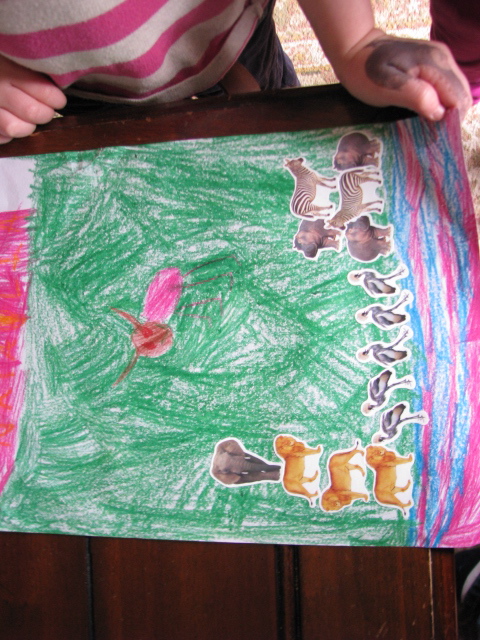What a great 2 weeks of school...loving some excellent conversations...engaged children...and sunny days!
One of the most favourite parts of my "job" is when children discover the joy of reading: reading for information and knowledge not only for entertainment. This has happened again! One young girl aged 5 1/2 is reading everything. She grabbed a book about giraffes and brought it to the table during snack, she just couldn't put it down! As she read aloud to the group, she would stop and say, "Did you just hear this? It says in the book that acacia leaves are 74 percent water, that means mostly water, so that is why giraffes can go for so long without drinking water." She would continue reading only to stop to tell them another interesting fact like "a giraffe's stomach is divided into four compartments like that of a cow." She read to them what that meant but I won't re-write it all!
We have been learning about a very important woman named Wangari Maathai from Kenya, Africa. Personally, I think we can all learn much from her and I think it's a perfect way for us to end our unit study of Africa and prepare for our study of the environment and our impact on it for the month of May.
Wangari was a woman who loved her home country of Kenya. She grew up surrounded by the fertile soil, crops of maize, sugarcane and sweet potatoes. She gathered firewood close to her village but never from the Fig Tree that grew close to the sparkling, clean river. The Fig Tree was sacred and all members of the village respected and cared for this tree. Wangari had a deep respect for this land and its people. She was saddened when she returned to her homeland. In only 5 years, while she studied biology at school abroad in America, her beloved country had changed, drastically. The country that once boasted beautiful green forests, fertile soil, and sparkling streams of fresh, clean water had been destroyed. Even the respected Fig Tree that once stood proud close to her village had been cut down. Destroyed by the government and corporate men who decided that it made more "cents" to strip the land bare for commercial farming plots to cultivate tea for export. Wangari knew she had to do something, because "something is better than nothing". She began by planting nine tree seedlings in her backyard, which all ended up dying. She did not give up though, instead she planted more. This was an important lesson for the other women to see. Wangari explained to the women that the tree roots hold the soil in place. When the soil is held in place, the water from the rains are soaked up, and when the water is soaked up the topsoil will not run away like in a landslide and it will not blow away in strong winds. The trees will also produce shade from the strong heat of the sun so the soil will not dry out as quickly. Trees are important. Trees will give us our land back. Wangari also noticed that the women and children were becoming weak and sickly. She determined that it was because of the poor nutritional foods they were eating. When the government men cut all the trees down for commercial farming families were unable to grow the food and raise the animals they would use for their own consumption which provided them with good health. Instead, the people now had to rely on foreign food coming in the form of highly processed - nutrient removed flours and meal. Wangari encouraged the women to collect the seeds from the plants they could find to begin cultivating their own vegetable plots again. Over time other women began to hear about this effort of Wangari and they too joined in. Wangari and the Greenbelt Movement was not welcomed by government officials or the commercial farmers. She was arrested and jailed. Yet, woman by woman, tree by tree, they clothed Kenya with the green of her youth.
We also are learning about "The Little Hummingbird". We have read the story before (when we studied North America) but we are studying it again because Wangari Maathai used this as a lesson for children to understand that even if no one around you is doing anything about a situation that you know is wrong, or too difficult to change, it is better to do something than nothing. We can do our part to make small changes in the world around us. We are to be like the hummingbird. If you haven't read this story...be sure to borrow it from the local library (although I have it loaned out at the moment!)
We have learned a song as well to help us remember about Wangari Maathai...the words go like this.
"Oh we heard, we heard the news of Wangari Maathai
Oh we heard about you, Wangari Maathai,
One woman, 30 million trees, one woman's path to peace
Oh if this, if this be true, just think what we could do!
Woman by woman, tree by tree, one woman's path to peace
Oh little tree, let's grow, oh watoto love you so!"
Watoto means children in swahili.
Here are some pictures of art landscapes I asked the children to draw...










No comments:
Post a Comment
Note: only a member of this blog may post a comment.